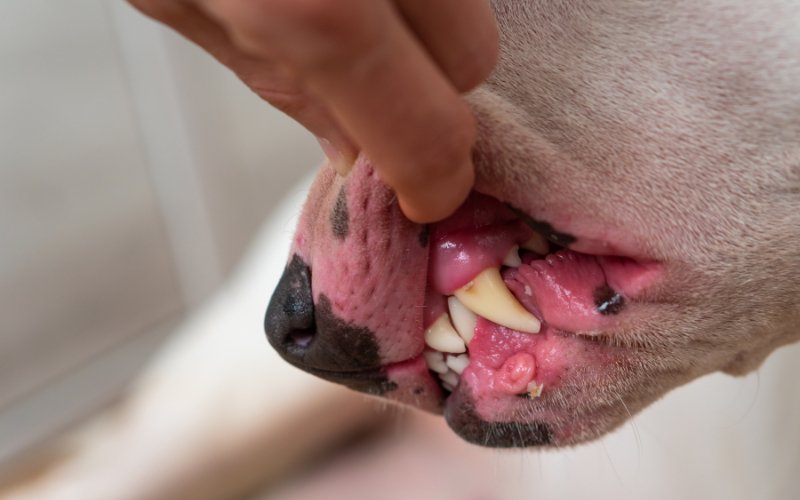
How To Take Care Of My Bull Terrier's Teeth?
|
Time to read 4 min
|
Time to read 4 min
©24K-Production via Canva.com
Good dental health is important for everybody, even our dogs! Brushing your Bull Terrier's teeth is an essential part of overall dental care. Taking good care of your Bull Terrier's teeth can decrease their risk of dental diseases.
We have come up with an informative post on how to take care of your Bull Terrier's teeth. Let's get started!
Adult Bull Terriers have 42 teeth in their mouth. Their upper jaw is known as Maxilla and lower jaw is known as Mandible. Maxilla has 20 teeth while Mandible has 22 teeth.
Just like people, all dogs go through two sets of teeth in their lifetime. Bull Terrier puppies usually have a total of 28 teeth, 14 in the upper jaw and 14 in their lower jaw. Bull Terriers usually have the following types of teeth in their mouth:
Most pet owners don’t recognize that their Bull Terriers have a dental issue until the problem has increased. Here are some signs of dental disease in Bull Terriers:
Regular dental check-ups and proper dental care can help prevent these issues and ensure your Bull Terrier's oral health. If you notice any signs of dental disease, you should talk to your vet.
It is essential to brush your Bull Terrier's teeth regularly. This will help them to prevent cavities, gum disease, and other oral problems. Ideally, you’ll brush your Bull Terrier's teeth every day. Realistically, try to brush their teeth as frequently as possible, at least a few times a week.
Dental chews and dental treats can help prevent plaque and tartar buildup. There are various types of dental chews; always choose the correct size for your Bull Terrier. Avoid cooked bones because these can splinter and cause broken or worn teeth. Also, limit the number of dental treats as extra calories may cause your Bull Terrier to gain weight.
It's easy to make brushing fun for Bull Terriers; all you need is a little creativity. Encouragement and reward systems can help your Bull Terrier make teeth cleaning a habit.
The key to home dental care is to start when Bull Terriers are puppies. It will help set your Bull Terrier up with good dental health for their whole life.
Although a bit expensive, professional dental cleaning is the best way to maintain your Bull Terrier's oral hygiene. Regular vet check-ups and teeth cleaning are essential to maintain good dental hygiene in your Bull Terrier. Talk with your vet to make sure you're taking extra steps to protect your Bull Terrier's teeth.
Regular dental cleaning along with occasional professional cleanings at your vet is critical to your Bull Terrier's overall health. Regular dental care will help to:
Establishing an at-home dental care routine is an important part of your Bull Terrier's overall health. Regular brushing is the best thing you can do to keep your Bull Terrier's mouth in good condition.
Here are some useful tips for a great tooth brushing experience.
Bull Terrier puppies learn and pick up new things faster. Start toothbrushing in puppyhood as it’s a good habit to get into early.
Get your Bull Terrier used to you touching their mouth and teeth and toothbrushing. If your Bull Terrier seems upset, stop, and try again later.
Pick a time that suits your daily routine. Try to keep it as your usual time to brush their teeth. It doesn’t matter at what time of the day you brush their teeth.
Start with the front teeth and then work your way back to the molars. Try a few teeth at a time. Brush in small circles over all of the top and bottom teeth. Aim for two minutes total. Over time, your Bull Terrier will be comfortable to do the entire mouth.
Keep each brushing session short and sweet. It should be no more than a couple of minutes.
Every dog is different. So, train at a pace that suits you and your Bull Terrier.
Try to make brushing an enjoyable experience. Give lots of praise and a reward but only for good behavior.
Take care when putting your fingers into your Bull Terrier's mouth. We don’t recommend doing so if your Bull Terrier is likely to become aggressive.
Be sure to purchase canine-specific toothbrushes and toothpaste as human toothpaste can be harmful for Bull Terriers. The pH level in a Bull Terrier's mouth is different from the pH level in a human’s mouth.
We hope these tips will help make brushing your Bull Terrier's teeth an enjoyable experience for everyone.
Want more years with your precious furry child? Keep their teeth clean and maintain good dental hygiene! Caring for your Bull Terrier's teeth can easily add two to three years to their life. The earlier you instill good oral care habits in your Bull Terriers, the better it is for your dog.
Healthy mouth is important to their overall health and quality of life. With a little daily attention to dental care from puppyhood, Bull Terriers can have healthy teeth for a lifetime. Use your dog's annual vet checkup as an opportunity to discuss their teeth and overall dental health.
